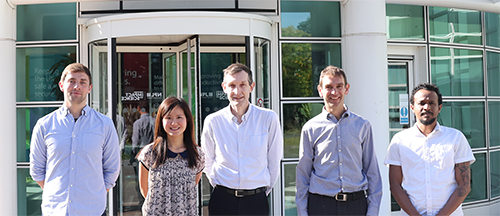Biome Bioplastics is UK company developing bio-based compostable plastics for sustainable packaging and agricultural applications. The goal of the company is to produce bioplastics that can challenge and replace conventional fossil-based polymers but are completely compostable. These innovative materials have the potential to significantly reduce the impact of plastics on the environment.
Biome aimed to develop a new technology that enables the production of novel bioplastics with properties similar to those of conventional plastics but that are home compostable, allowing consumers to take ownership of their compostable waste. However, Biome needed to better understand the root cause of some disintegration behaviour in their new products. Their new bioplastic products have reported composting temperatures as low as 25 °C, rather than the industry standard temperature of 50 °C. The complexity of the composting environment presented the need for investigations into the material properties, behaviour and performance of the bioplastics.
With its world-leading expertise in surface technology and advanced engineering materials, NPL supported Biome through the Innovate UK Analysis for Innovators Programme. NPL investigated the physical and chemical properties of their bioplastics through their application of their thermal, morphological, topological, chemical and gas physisorption analysis capabilities. Different forms of the polymers (sheets vs. fibres), as well as the samples collected at various stages and conditions of the compostability tests, were measured to understand the correlation between the materials’ properties and their disintegration performance. The resulting information enabled Biome to identify some key material characteristics, such as porosity and crystallinity, which are likely associated with the disintegration behaviour of end products.
Based on these findings, NPL and Biome developed rapid, cost-effective and quantitative methods which can potentially be used to monitor key process parameters to ensure product quality and reproducibility. The knowledge obtained from this work can be further exploited to broaden Biome’s product ranges, bringing high-volume, cost-effective biomaterials and bioplastics to market. Since disintegration tests are expensive and time-consuming, unlocking this knowledge could also lead to the development of new analytical tools which predict the end-of-life performance of products. NPL continued the collaboration with Biome to investigate the impact of the manufacturing process on product performance, which is of great importance to the sustainability of plastics in their life cycle.
Collaborating with NPL has been important in deepening our understanding of several of our products and uncovering the root causes behind their unique behaviours. Through a structured approach and rigorous analysis, NPL's team demonstrated a high level of professionalism, consistently delivering high-quality data within agreed-upon deadlines. This timely access to a wide range of analyses complemented our in-house capabilities and played a pivotal role in supporting the development of Biome's next generation of bio-based compostable products. We are excited about the ongoing partnership with the NPL team and look forward to delivering further technical milestones together
Paul Mines, CEO - Biome Bioplastics
It has been an exciting collaboration. Understanding how fundamental material properties impact the life cycle of sustainable plastics is of great importance to the polymer manufacturing industry. It was great to see how surface chemical analysis, together with some advanced material characterisations, can answer some key questions in understanding the root course of the materials’ disintegration behaviour in complex composting environments such as our gardens.
Dr Yiwen Pei, Senior Scientist - NPL
